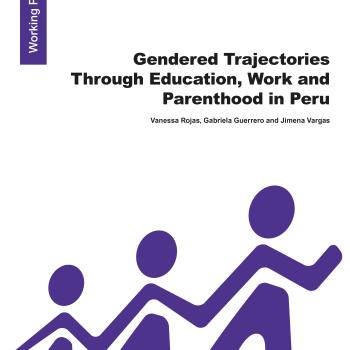
This paper explores young people’s inter-related transitions and pathways through schooling, work and parenthood, with a special focus on the way gender affects trajectories into adulthood among a sample of young people growing up in poverty. We report on the outcomes and trajectories of the Young Lives Older Cohort children who participated in longitudinal qualitative research between 2007 and 2014, when they were aged between 13 and 20, and we combine this analysis with descriptive survey statistics from the wider sample of Older Cohort children in Peru.
At the age of 19, 70% of the young people in the Older Cohort had completed secondary education and 39% of the cohort had started tertiary education. Young people from poorer families or rural areas were less likely to have completed school than their peers, but we find no evidence of gender or ethnic differences in school completion rates. Data from the qualitative analysis show that gender mattered in young people’s trajectories when families had limited economic resources, in both rural and urban scenarios. In addition, our study shows that role of the family seems to be very important in decisions about young people’s futures. Although gender differences were not observed in children’s education trajectories during primary and secondary school, we found that low-income families tended to prioritise boys’ education at post-secondary level. Moreover, our results show that in rural areas young people who wished to pursue post-secondary education might also decide to work; however, these temporary jobs exposed them to risky situations and maltreatment, especially girls. In rural areas, social norms regarding gender are important to an understanding of why work is the most common trajectory for young men in early adulthood. Working is a positive thing for young men because it positions them as providers. In urban areas, young men’s involvement in work and families’ expectations are different; parents try to postpone their children’s access to money, in order to keep them away from drugs, alcohol and gangs that might lead them astray. Our findings about the transition into parenthood show that there was a clear difference between the experiences of boys who became parents at a young age or were expecting a child, and those of girls. The situation was worse for girls. Boys were more protected by their parents, who supported them emotionally and financially in the experience of becoming a parent and starting a new family.Peruvian young people experience major disparities in their paths to adulthood, and it is necessary to strengthen policies that support disadvantaged young people’s access to tertiary education by incorporating a gender perspective and to provide young people with information and advice on jobs and careers, so that they can access jobs with better working conditions. Jobs currently available to young people offer few or no opportunities to learn and develop. Rural girls and adolescent mothers in particular can be considered vulnerable groups, and scholarships should be designed to help them access tertiary education.

This paper explores young people’s inter-related transitions and pathways through schooling, work and parenthood, with a special focus on the way gender affects trajectories into adulthood among a sample of young people growing up in poverty. We report on the outcomes and trajectories of the Young Lives Older Cohort children who participated in longitudinal qualitative research between 2007 and 2014, when they were aged between 13 and 20, and we combine this analysis with descriptive survey statistics from the wider sample of Older Cohort children in Peru.
At the age of 19, 70% of the young people in the Older Cohort had completed secondary education and 39% of the cohort had started tertiary education. Young people from poorer families or rural areas were less likely to have completed school than their peers, but we find no evidence of gender or ethnic differences in school completion rates. Data from the qualitative analysis show that gender mattered in young people’s trajectories when families had limited economic resources, in both rural and urban scenarios. In addition, our study shows that role of the family seems to be very important in decisions about young people’s futures. Although gender differences were not observed in children’s education trajectories during primary and secondary school, we found that low-income families tended to prioritise boys’ education at post-secondary level. Moreover, our results show that in rural areas young people who wished to pursue post-secondary education might also decide to work; however, these temporary jobs exposed them to risky situations and maltreatment, especially girls. In rural areas, social norms regarding gender are important to an understanding of why work is the most common trajectory for young men in early adulthood. Working is a positive thing for young men because it positions them as providers. In urban areas, young men’s involvement in work and families’ expectations are different; parents try to postpone their children’s access to money, in order to keep them away from drugs, alcohol and gangs that might lead them astray. Our findings about the transition into parenthood show that there was a clear difference between the experiences of boys who became parents at a young age or were expecting a child, and those of girls. The situation was worse for girls. Boys were more protected by their parents, who supported them emotionally and financially in the experience of becoming a parent and starting a new family.Peruvian young people experience major disparities in their paths to adulthood, and it is necessary to strengthen policies that support disadvantaged young people’s access to tertiary education by incorporating a gender perspective and to provide young people with information and advice on jobs and careers, so that they can access jobs with better working conditions. Jobs currently available to young people offer few or no opportunities to learn and develop. Rural girls and adolescent mothers in particular can be considered vulnerable groups, and scholarships should be designed to help them access tertiary education.

